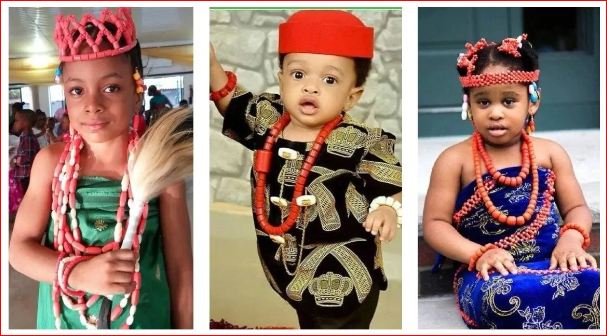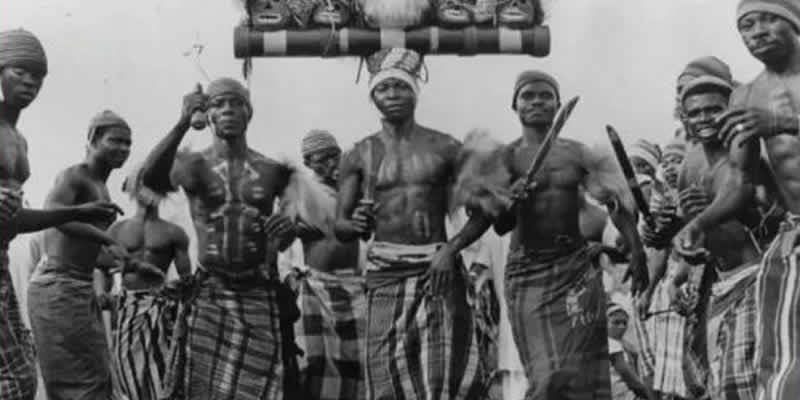Igbo culture (Igbo: Ọmenala ndị Igbo) are the customs, practices and traditions of the Igbo people of southeastern Nigeria. It comprises archaic practices as well as new concepts added into the Igbo culture either by cultural evolution or by outside influence.
While today many Igbo people are Christians, the traditional ancient Igbo religion is known as Odinani. In the Igbo mythology, which is part of their ancient religion, the supreme God is called Chukwu (“great spirit”); Chukwu created the world and everything in it and is associated with all things on Earth.
Traditionally the attire of the Igbo generally consisted of little clothing as the purpose of clothing then was to conceal private parts, although elders were fully clothed ;). Children were usually nude from birth till their adolescence (the time when they were considered to have something to hide) but sometimes ornaments such as beads were worn around the waist for medical reasons.
Modern Igbo traditional attire is generally made up, for men, of the Isiagu top which resembles the African Dashiki. Isiagu (or Ishi agu) is usually patterned with lions heads embroidered over the clothing, It can also be plain, (usually black). It is worn with trousers and can be worn with either a traditional title holders hat (a fez named okpu agu or agwu), or with the traditional Igbo stripped men’s hat (which resembles the Bobble hat).

For women, an embodied puffed sleeve blouse (influenced by European attire) along with two wrappers (usually modern Hollandis material) and a head scarf are worn.
There are two basic types of “Masquerade ceremony”, visible and invisible. The visible masquerades are meant for the public. They often are more entertaining. Masks used offer a visual appeal for their shapes and forms. In these visible masquerades, performances of harassment, music, dance, and parodies are acted out (Oyeneke 25).
The invisible masquerades take place at night. Sound is the main tool for them. The masquerader uses his voice to scream so it may be heard throughout the village.
The masks used are usually fierce looking and their interpretation is only fully understood by the society’s members. These invisible masquerades call upon a silent to strike fear in the hearts of those not initiated into their society.
Though many characteristics of the Igbo culture are a bit unconventional, when it comes to socializing they tend to be very traditional. Respect is given to the male head of the household, and also to the elderly. It is ingrained in children from an early age to respect their elders at all times, and under all circumstances.
The Igbo people are known for their appreciation of music and various handmade instruments. Most of their instruments are either in the string or woodwind categories. They often play the “opi” (similar to the flute) or the “ubaw-akwala” which resembles a 5 triangular guitar. Musicians will often circle the land at night playing the ubaw-akwala for residents and passersby.
The Igbo is a member of the Volta-Niger branch of the Niger-Congo family of languages. It is spoken by more than 18 million people in Nigeria and Equatorial Guinea. There are several variations (dialects) of the Igbo language but the standard written form of Igbo is based on the Owerri and Umuahia dialects which have been in use since 1962.
The Igbo people have one of the most nutritious and delicious delicacies that sort for all over the world. Their cuisine includes the dishes like ukwa (breadfruit), Ofe Onugbo (bitter leaf soup), Ofe Oha/Ora (Oha soup), Ofe Okazi (Okazi soup), Abacha. Ugba (Oil bean) and many more
